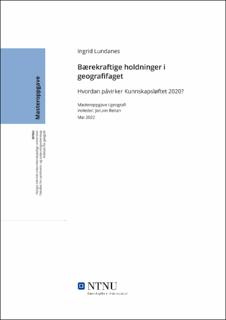| dc.contributor.advisor | Reitan, Jorunn | |
| dc.contributor.author | Lundanes, Ingrid | |
| dc.date.accessioned | 2022-07-14T17:20:59Z | |
| dc.date.available | 2022-07-14T17:20:59Z | |
| dc.date.issued | 2022 | |
| dc.identifier | no.ntnu:inspera:108357483:22731943 | |
| dc.identifier.uri | https://hdl.handle.net/11250/3005593 | |
| dc.description.abstract | Bærekraftig utvikling har med innføringen av det nye læreplanverket, Kunnskapsløftet 2020, fått en sentral posisjon i geografifaget, og det er ikke uten grunn. Elevene må forberedes på å møte utfordringer knyttet til blant annet klimaendringer, befolkningsvekst og økende gap mellom fattige og rike. Å skape bærekraftige holdninger hos elevene er en naturlig del av disse forberedelsene. Formålet med denne masteroppgaven er å undersøke hvordan innføringen av Kunnskapsløftet 2020 vil påvirke geografifagets potensial til å skape bærekraftige holdninger blant elevene. Oppgaven ser på endringene fra Kunnskapsløftet 2006 til Kunnskapsløftet 2020, på hvordan man kan skape bærekraftige holdninger gjennom undervisning og på hvordan geografifaget spesielt kan bidra til å skape bærekraftige holdninger. For å undersøke dette har jeg gjennomført kvalitative intervjuer med fire lærere fra tre ulike videregående skoler, og to fokusgruppeintervjuer med fire og fem elever.
De sentrale endringene i geografifaget fra Kunnskapsløftet 2006 til Kunnskapsløftet 2020 er at bærekraftig utvikling har fått større plass, fokuset har blitt mer samfunnsgeografisk, antall kompetansemål er redusert, og innholdet oppleves som et steg opp på Blooms taksonomi. Det er også økt fokus på dybdelæring og tverrfaglig samarbeid.
Resultatene fra intervjuene viser til en rekke utfordringer når det gjelder å skape bærekraftige holdninger blant elevene, der det største hinderet er mangel på tid. Oppgaven er innom følgende prinsipper som kan bidra til å skape bærekraftige holdninger: identifisering av hvilken holdningskomponent som preger holdningen man ønsker å endre, konkretisering og aktualisering av undervisning, undervisning OM, I, FOR og SOM bærekraftig utvikling, samt arbeid med å utvikle elevenes handlekraft og handlingskompetanse.
Geografifaget har en unik posisjon til å jobbe med bærekraftige holdninger siden faget knytter sammen naturvitenskapelige og samfunnsfaglige perspektiv. Geografisk dannelse går også hånd i hånd med utvikling av bærekraftige holdninger. Elevene trekker frem at det er gjennom geografifaget de har lært desidert mest om temaer som menneskeskapte klimaendringer, ressurser og lokalisering, som alle er aktuelle for bærekraftig utvikling.
Totalt sett vil bærekraftig utvikling sin tydeligere posisjon i geografifaget, det økte fokuset på dybdelæring og steget opp på Blooms taksonomi som kom med Kunnskapsløftet 2020, være med på å øke geografifagets potensial til å skape bærekraftige holdninger hos elevene. | |
| dc.description.abstract | With the introduction of the new curriculum, Kunnskapsløftet 2020, sustainable development has gained a central position in geography, and for good reason. The students must be prepared to meet challenges linked to climate change, population growth and a growing gap between the wealthy and the poor. Creating sustainable attitudes amongst the students is a natural part of these preparations. The purpose of this master’s thesis is to investigate how the introduction of Kunnskapsløftet 2020 will affect the potential of geography to create sustainable attitudes among the students. The thesis explores the changes from Kunnskapsløftet 2006 to Kunnskapsløftet 2020, how one can create sustainable attitudes through education, and how the subject of geography in particular can contribute to creating sustainable attitudes. To investigate this, I have conducted qualitative interviews with four teachers at three different high schools, and two focus group interviews with four and five students.
The main changes in the subject of geography from Kunnskapsløftet 2006 to Kunnskapsløftet 2020 are that sustainable development has been given more space, the focus has gotten more socio-geographical, the number of competence aims has been reduced and the contents of the subject is experienced as a step up on Blooms taxonomy. It is also an increased focus on in-depth learning and interdisciplinary cooperation.
The results show that there are several challenges connected to creating sustainable attitudes amongst the students, where lack of time is the biggest one. The thesis touches on the following principles that can contribute to creating sustainable attitudes: identification of which attitude component that characterize the attitude one wishes to change, concretization and actualization of education, education ABOUT, IN, FOR and AS sustainable development, as well as advances to develop the students’ action and action competence.
The subject of geography has a unique position to work on sustainable attitudes, as the subject connects perspectives from natural science and social science. Geographic education also goes hand in hand with the development of sustainable attitudes. The students point out that it is through the subject of geography that they have learned most about topics like man-made climate change, resources and location, all of which are relevant for sustainable development.
Overall, the strengthened position of sustainable development in the subject of geography, the increased focus on in-depth learning and the step up on Blooms taxonomy in Kunnskapsløftet 2020, will help increase the potential of geography to create sustainable attitudes amongst the students. | |
| dc.language | nob | |
| dc.publisher | NTNU | |
| dc.title | Bærekraftige holdninger i geografifaget: Hvordan påvirker Kunnskapsløftet 2020? | |
| dc.type | Master thesis | |
